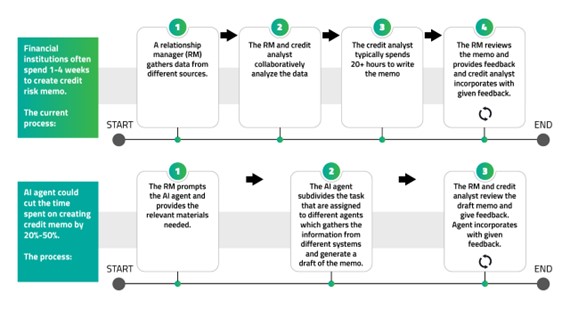Industries today are rapidly relying on intelligent automation systems that independently handle tasks, make decisions, and adapt to any change in situation. AI-driven agents are designed to minimize workloads by managing anything from day-to-day operations like data entry to more complex activities like real-time data analysis. These agents are steadily becoming integral to modern operations, enhancing productivity to focus on more strategic priorities. . According to Gartner, by 2029, agentic AI will autonomously resolve around 80% of common customer service issues without human intervention, leading to a 30% reduction in operational costs. Many enterprises have already discovered the power and efficiency of automation. Now, they can unlock the full value it offers to the finance function. According to a McKinsey survey, the share of finance functions adopting automation and artificial intelligence has more than tripled. Automation offers elevated productivity, enhanced user & customer experience, and guards against team burnout
How Do AI Agents Work?
Agentic AI combines perception, reasoning, and action to interact with its data environment and achieve defined goals autonomously. It can handle repetitive manual tasks and operates through a structured workflow involving several core components.
- User provides instructions: The user promptly interacts with the AI system using natural language. The AI system then identifies the intended action and can request additional information from the user if necessary.
- Agent system plans, sorts, and executes work: The agent system gets input into the specific workflow through prompts and process prompts. Manager subagents assign tasks or subtasks to specialized agents.
- The agent system iteratively improves output: Throughout the process, the agent may request additional information from the user to ensure greater accuracy and relevance.
Agent execution: The agent can execute any action to complete the user-requested task.

AI Agents have the potential to change the way we work by supercharging productivity:
High-level Use Case: Credit risk memos

Key Benefits of AI Agents in Finance Industry:
- Automation: AI agents can enhance automation by streamlining complex financial processes, reducing manual efforts, and improving operational efficiency.
- Save on costs: AI agents can reduce operational expenses by removing costly and inefficient processes and manual work.
- Break down silos: A network of interconnected, collaborative agents can reduce common obstacles that emerge from complex projects by streamlining data collection and workflows across different departments.
- Scale to changing needs: AI agents can easily adopt complex processes and a high volume of tasks, letting companies expand their operations without sacrificing efficiency.

is a dedicated Business Analyst at Happiest Minds, excelling in identifying and implementing RPA solutions for organizations. He is a team player with good problem-solving ability and a keen eye for analyzing business processes. Holding a Master’s in MBA (Operations) and a bachelor’s in mechanical engineering, he is a valuable asset to any organization seeking to streamline operations and enhance efficiency.








